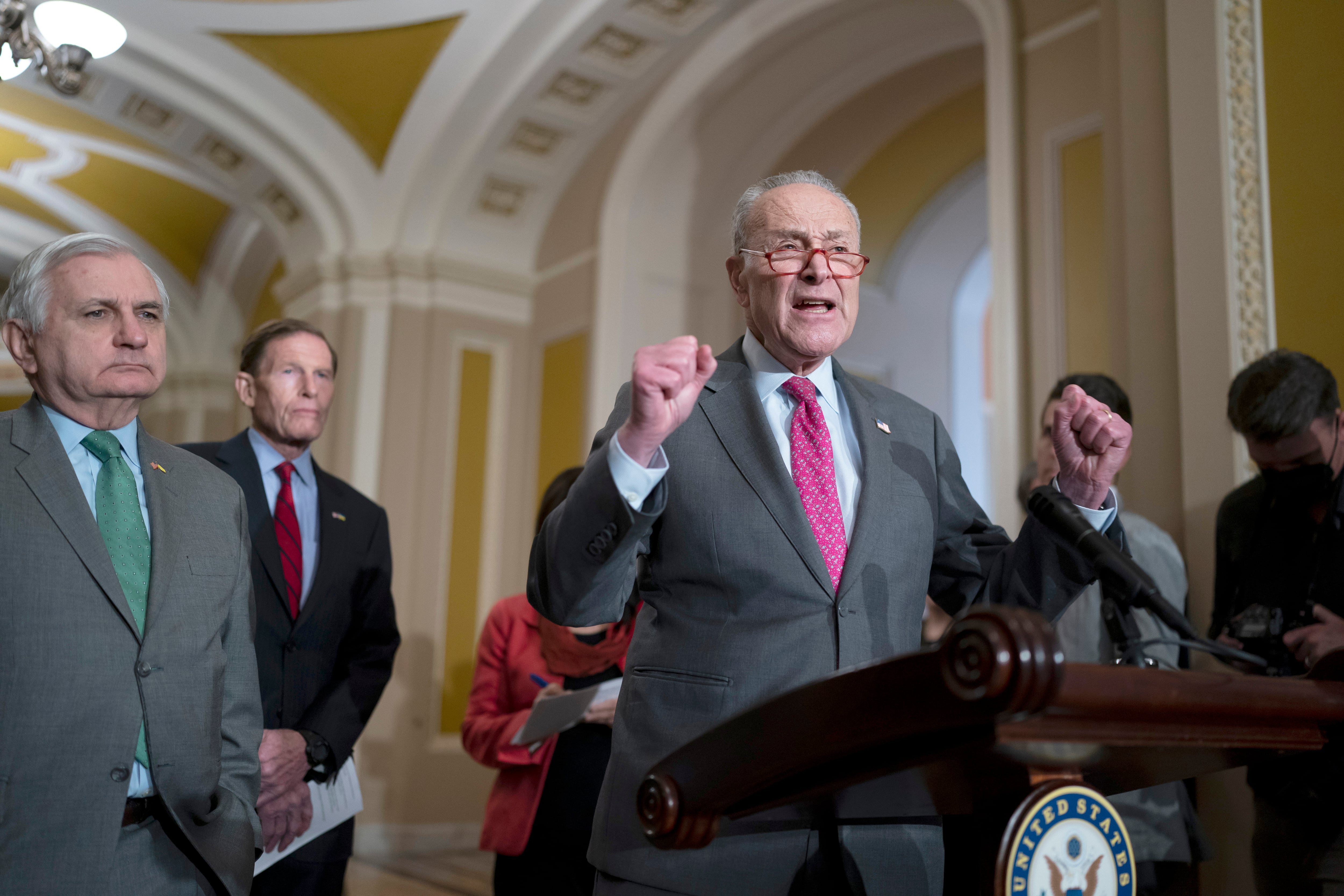Senate Democrats could circumvent the lingering hold on more than 300 senior military nominees as soon as they return to town next month. It would just take until next spring to finish the work.
Chamber leaders have already ruled out the approach as cumbersome and impractical, and insist that the only reasonable path ahead is for Sen. Tommy Tuberville, R-Ala., to end his blockade on the Defense Department confirmations.
But senators could be forced to take up the first individual nomination votes when they return in September on key military posts because of both the necessity of filling the leadership voids and the high-profile nature of the roles themselves.
Currently, three of the eight Joint Chiefs of Staff seats are without permanent, Senate-confirmed replacements because of the ongoing fight between Tuberville and Pentagon leaders. The next uniformed leaders for the Army, Navy and Marine Corps have all been named, but their confirmations are being held up by Tuberville because of his objections to the military’s abortion access policy.
RELATED

More than 300 others are caught in the political fight too, some since early March. Democratic leaders have blasted Tuberville for the move and begged Senate Republicans to intervene on the impasse.
“Similar to the way military officers hold each other to account, it’s time Senate Republican leaders bring their colleague into line and end this harmful blockade on merit-based military promotions,” Senate Armed Services Chairman Jack Reed, D-R.I., said in a statement earlier this month.
But Tuberville and his supporters have noted that Democratic lawmakers could also end the blockade by moving on the nominations one at a time, instead of insisting on an en-masse approval.
Tuberville’s objections block speedy Senate approval of large groups on non-controversial military nominees, as has been the chamber’s past practice to swiftly fill those key national security roles. It does not stop leaders from scheduling votes on individual candidates though, something Tuberville has suggested his critics should push for.
“They could solve this supposed problem. They just don’t want to,” Tuberville’s office said in a statement on Aug. 17. “As long as [Senate Majority Leader Chuck] Schumer refuses to vote on these nominations, then no Senate Democrat can complain about acting officials serving in the military’s most senior roles.”
Doing so would require a series of parliamentary moves that takes at least a few hours, and possibly as long as a few days. Senate Armed Services Committee officials earlier this summer estimated getting through all of the nominees would take more than 80 days of eight-hour Senate sessions.
And since that estimate was made, another 50 nominees were added to the backlog.
Given that the Senate typically operates for only three full days a week as senators spend the rest of the time at work in their home states, that would mean that the lawmakers would have to work on the defense nominees until March 2024 to get through the entire list. And that assumes no intervening work, to include the annual defense authorization bill and the new federal budget for next fiscal year.
Earlier this week, Sen. Ben Cardin, D-Md., told Politico that such a plan is not feasible.
“We don’t have the luxury to bring each one of these promotions up for a vote. There’s not enough time on the calendar for that,” he said. “I do hope that we will have time for individual votes on those that are contested, such as our judges and ambassadorships. But not on military [promotions]. That’s not controversial. That’s a waste of time.”
RELATED

High-profile posts, however, like the three vacant Joint Chiefs spots, and the pending nomination of Air Force Gen. Charles Q. Brown Jr. to be the next Joint Chiefs Chairman, will likely require individual votes, regardless of Tuberville’s block. That’s because such roles are subject to extra scrutiny, and individual votes allow lawmakers from both parties to praise or sound off on a White House’s leadership choices, and current administration policy.
“There are senior jobs that are so symbolic that they set the tone for everybody else, and that’s the chairman and the service chiefs,” said Peter D. Feaver, a Duke University professor focusing on civil-military relations. “I would be surprised if they don’t find a way to confirm Gen. Brown because his role is operationally critical, but it’s also symbolically critical.”
Feaver, who recently wrote the book “Thanks for Your Service” on the politicization of the American military, said Senate Democratic leaders face a dilemma in choosing any individual nomination votes for Pentagon leaders because it could weaken their argument that Tuberville is significantly damaging military planning and procedures.
“But some posts, particularly in the Indo-Pacific Command, are important intrinsically for the competition with China,” he said. “So, not confirming those is a gift to the Chinese government.”
For now, neither Schumer nor senior Democratic leaders have signaled that they will start picking out individual nominees for votes to fill those kinds of key leadership roles.
The last such vote was in mid-April, when the chamber voted 68-30 to approve Radha Iyengar Plumb as the Deputy Under Secretary of Defense for Acquisition and Sustainment. Plumb’s nomination had been blocked by Tuberville for several weeks before the vote.
Senate Armed Services Committee officials have warned that the total of backlogged nominees could top 600 before the end of the year if Tuberville does not relent, potentially causing cascading problems across the armed forces — and adding months more to the timeline to clear the backlog.
Senators are expected to return to Capitol Hill from their extended late summer break on Sept. 5.
Leo covers Congress, Veterans Affairs and the White House for Military Times. He has covered Washington, D.C. since 2004, focusing on military personnel and veterans policies. His work has earned numerous honors, including a 2009 Polk award, a 2010 National Headliner Award, the IAVA Leadership in Journalism award and the VFW News Media award.




